Thomas James Richards, Diaries, Transcript Vol. 4, 9 November 1916 - 31 May 1918 - Part 3
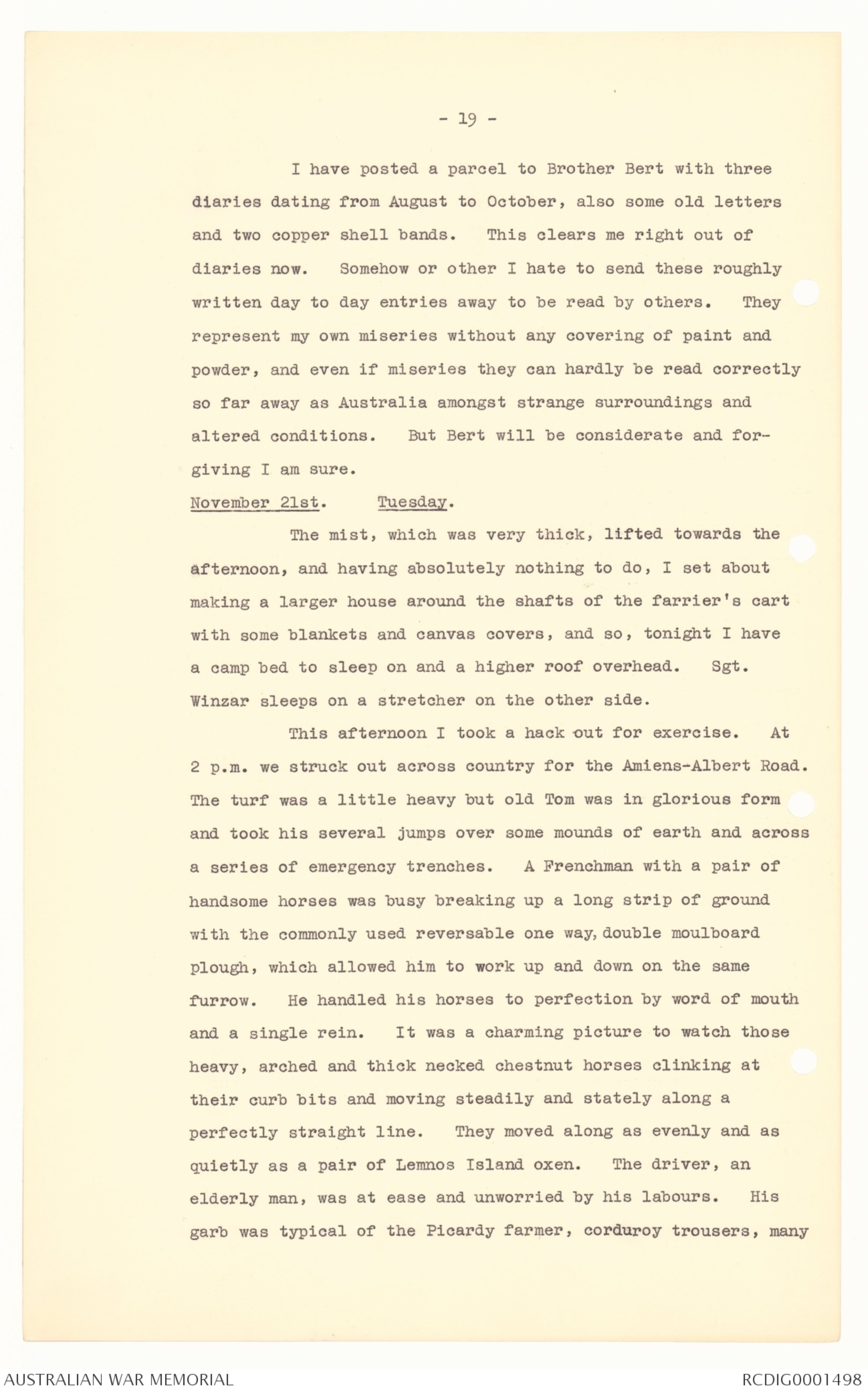
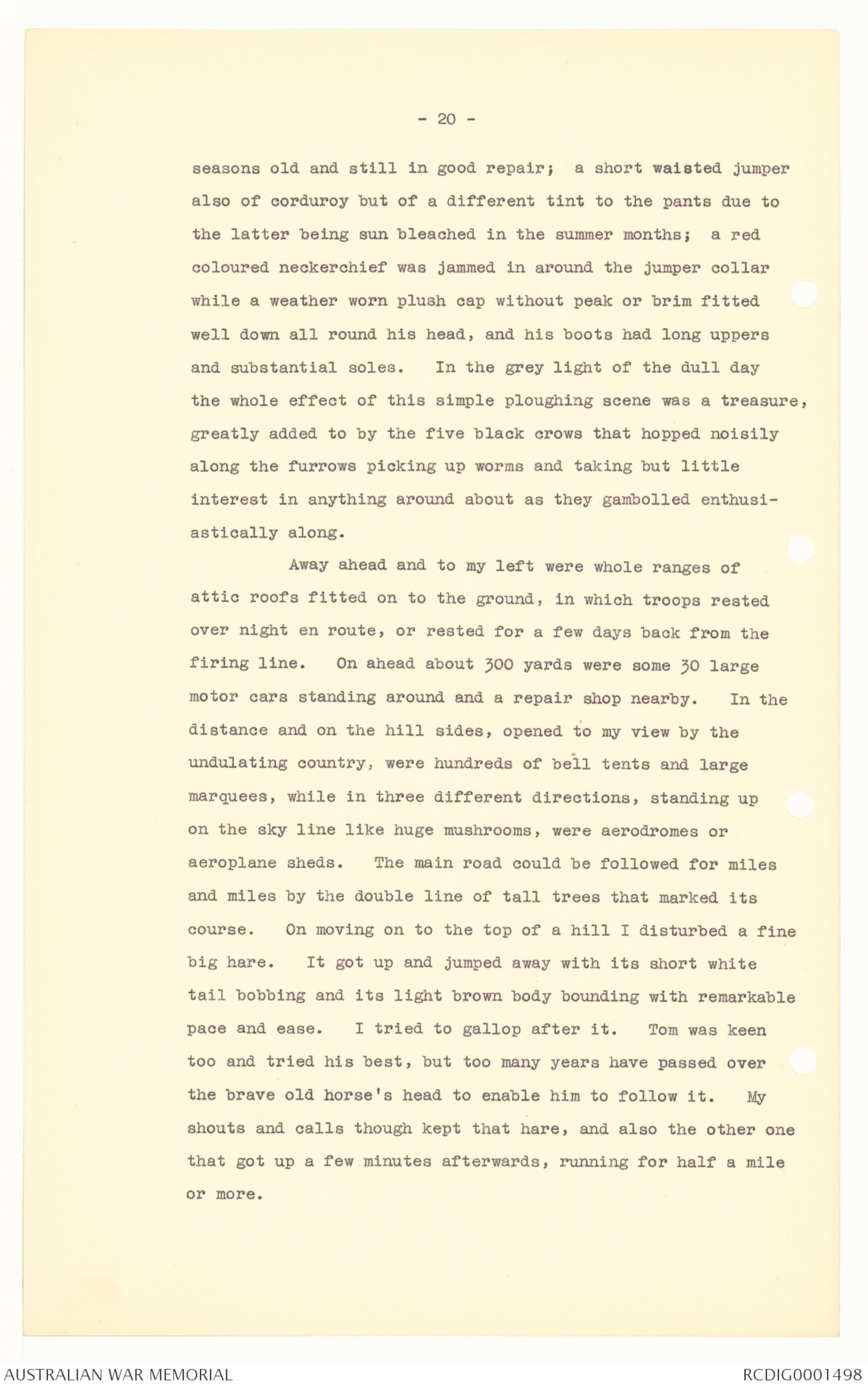
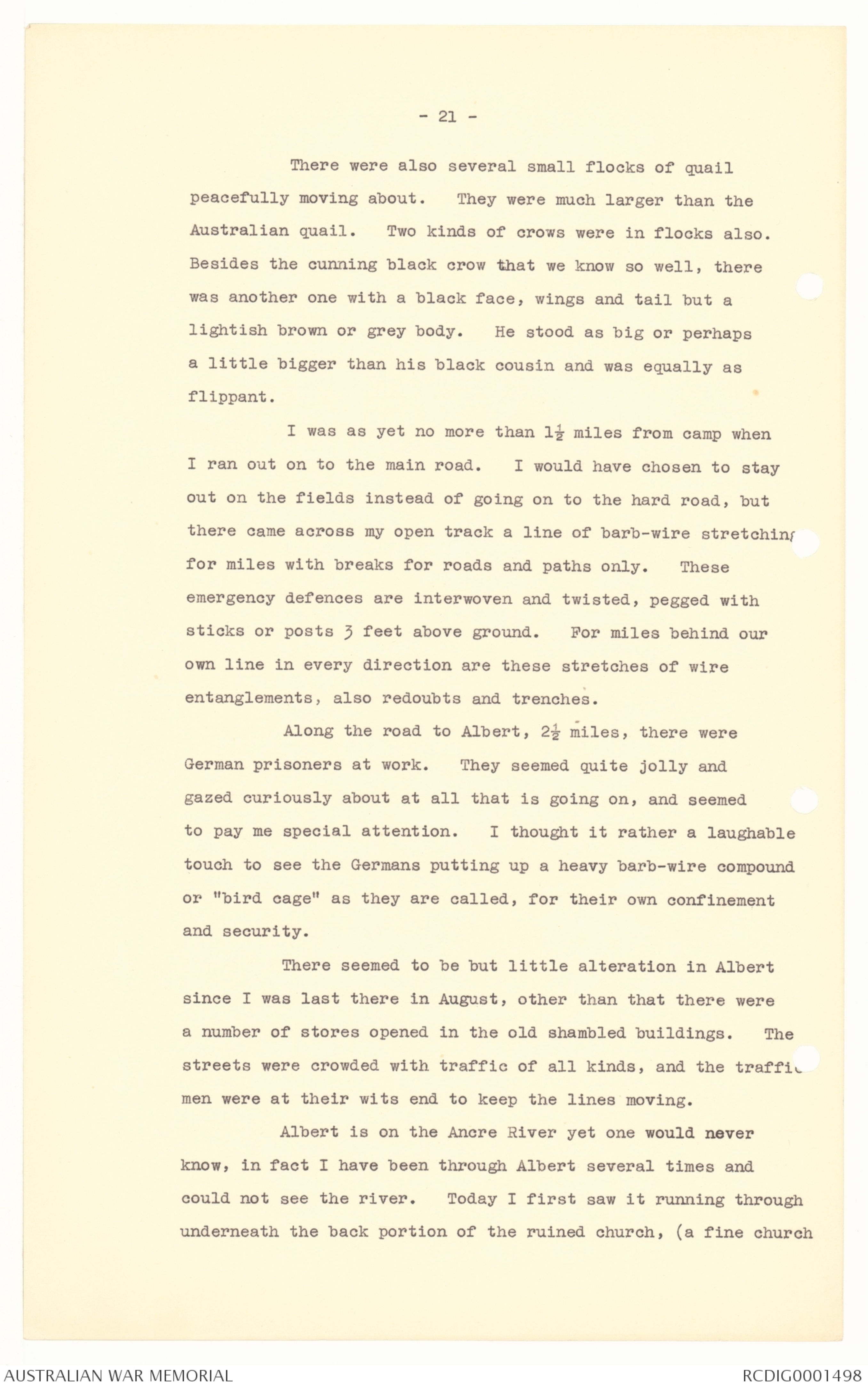
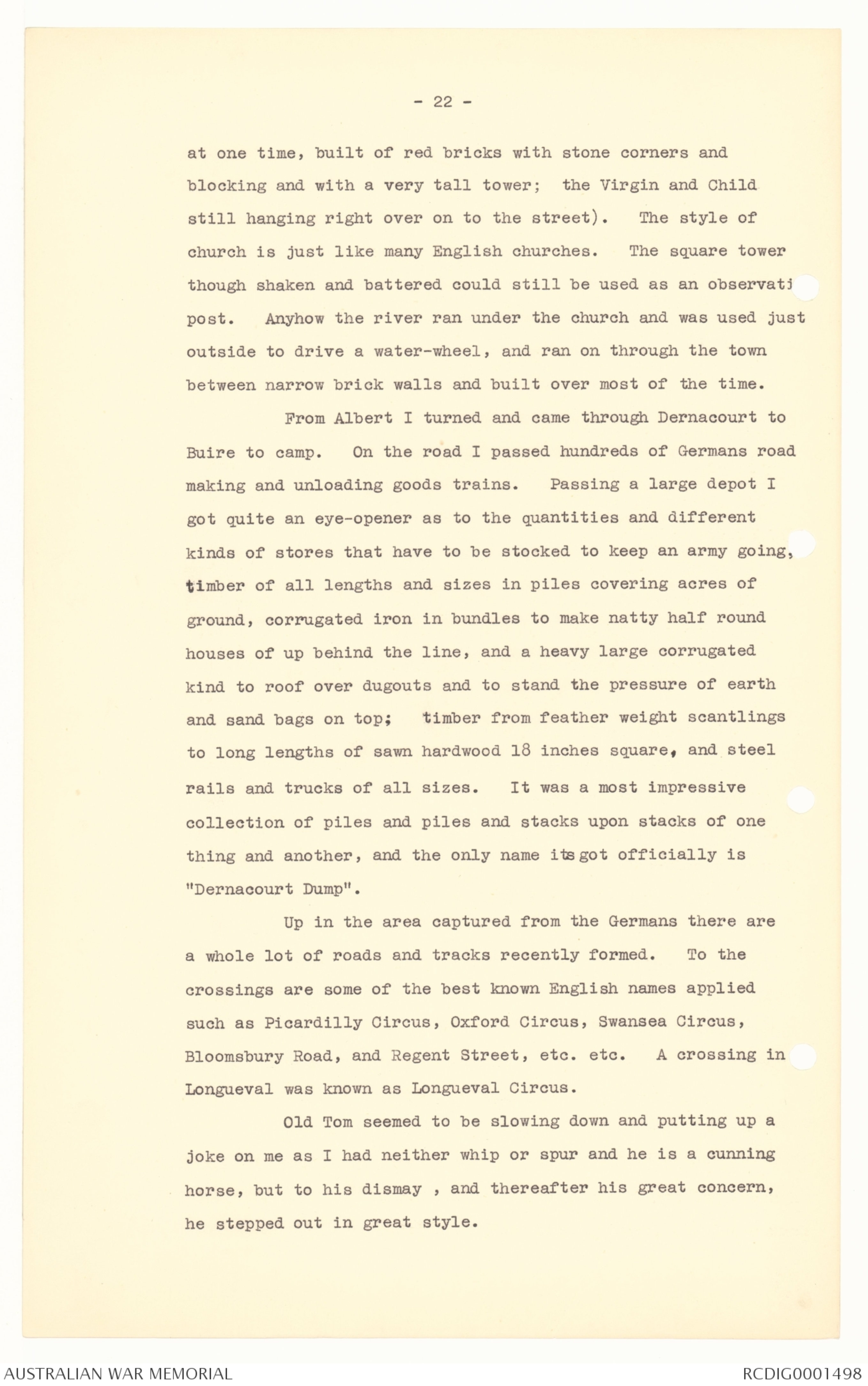
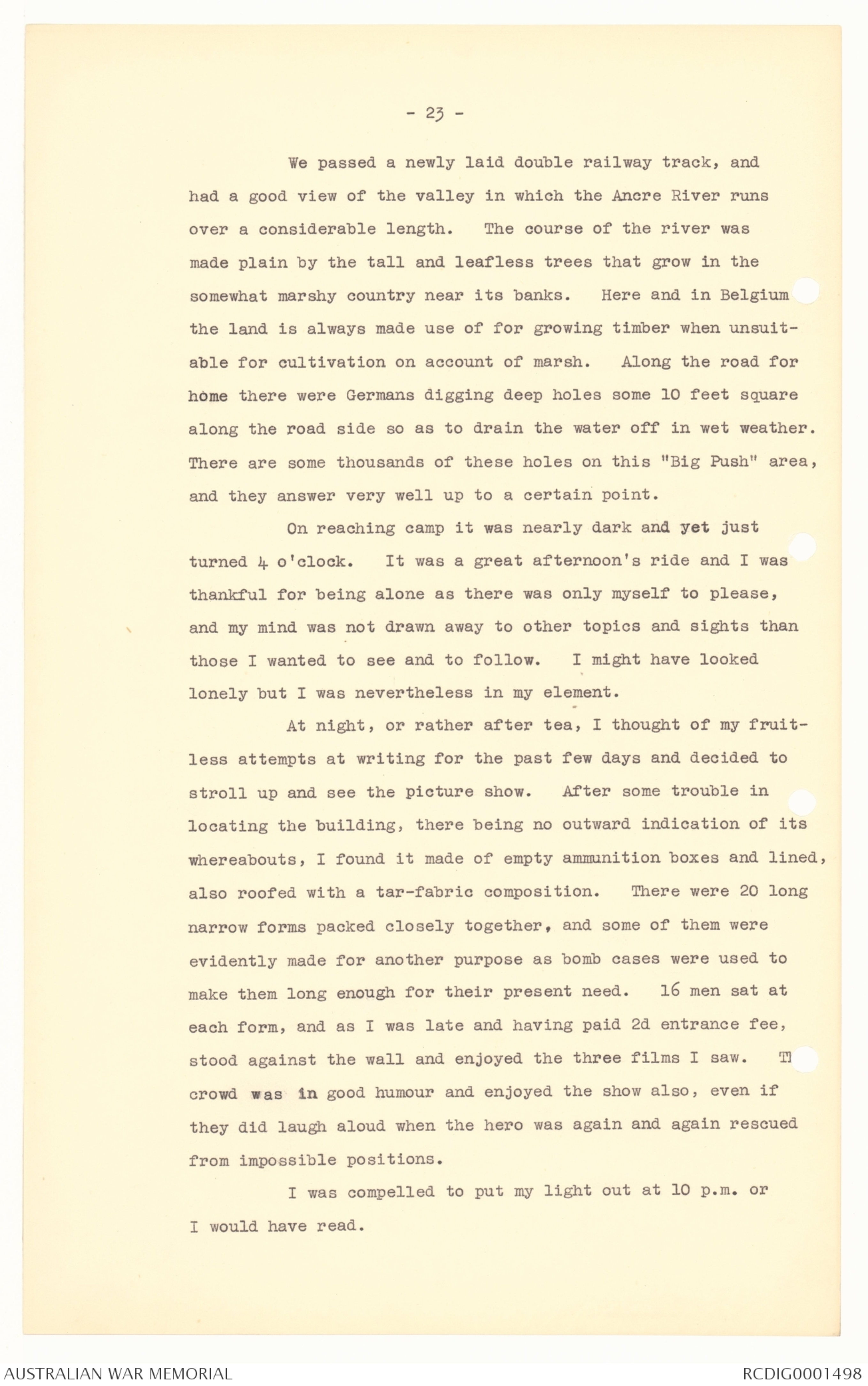
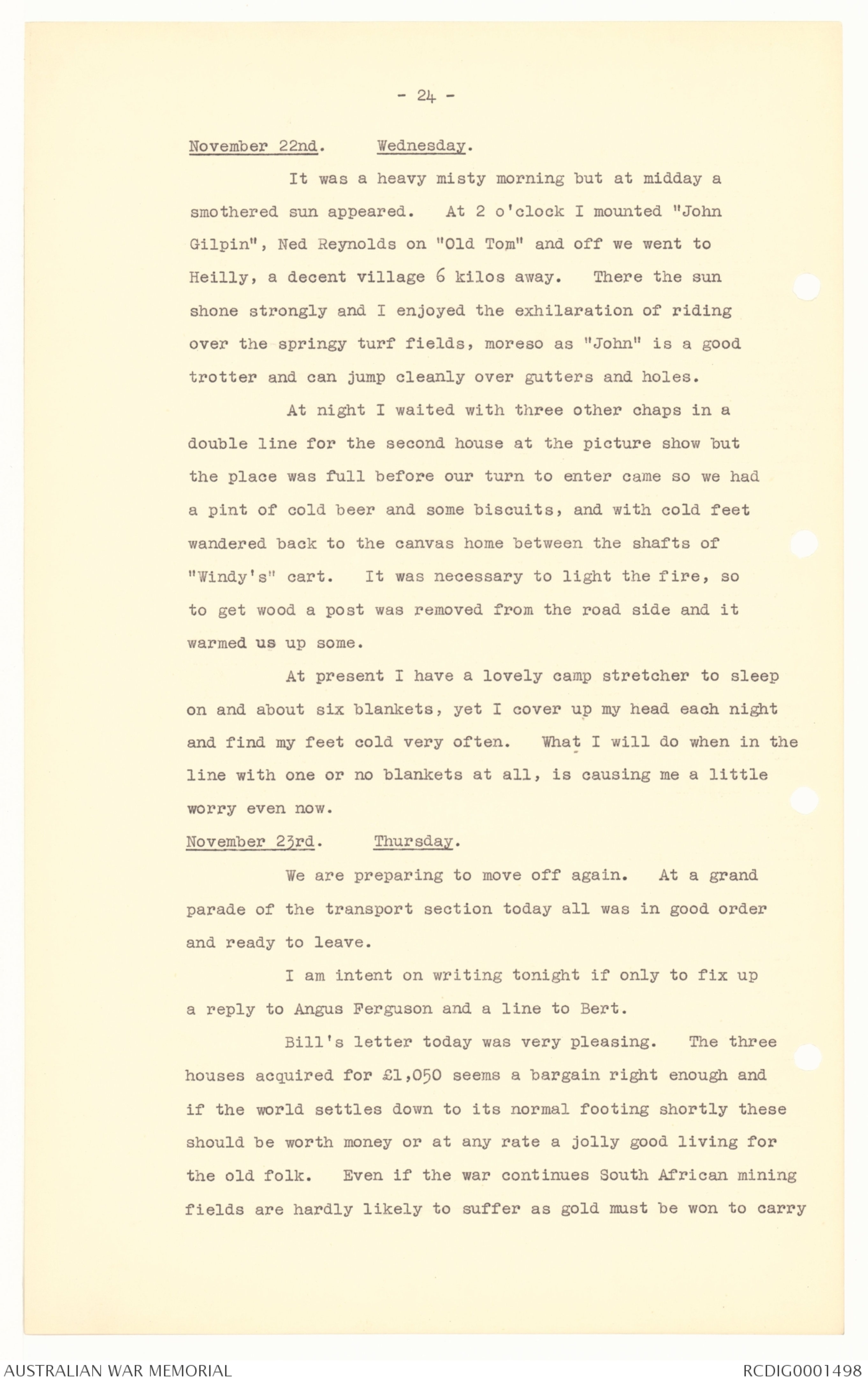
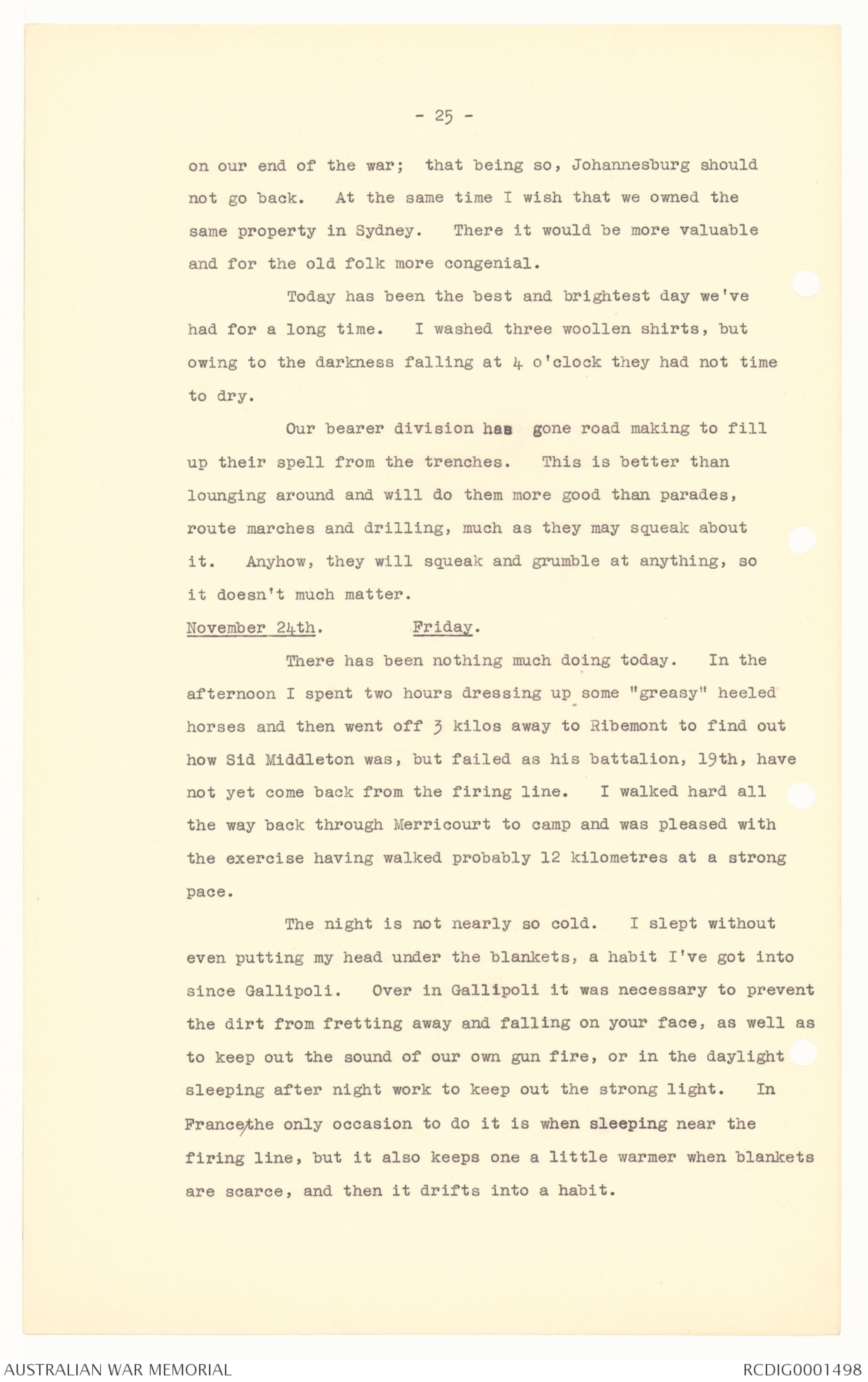
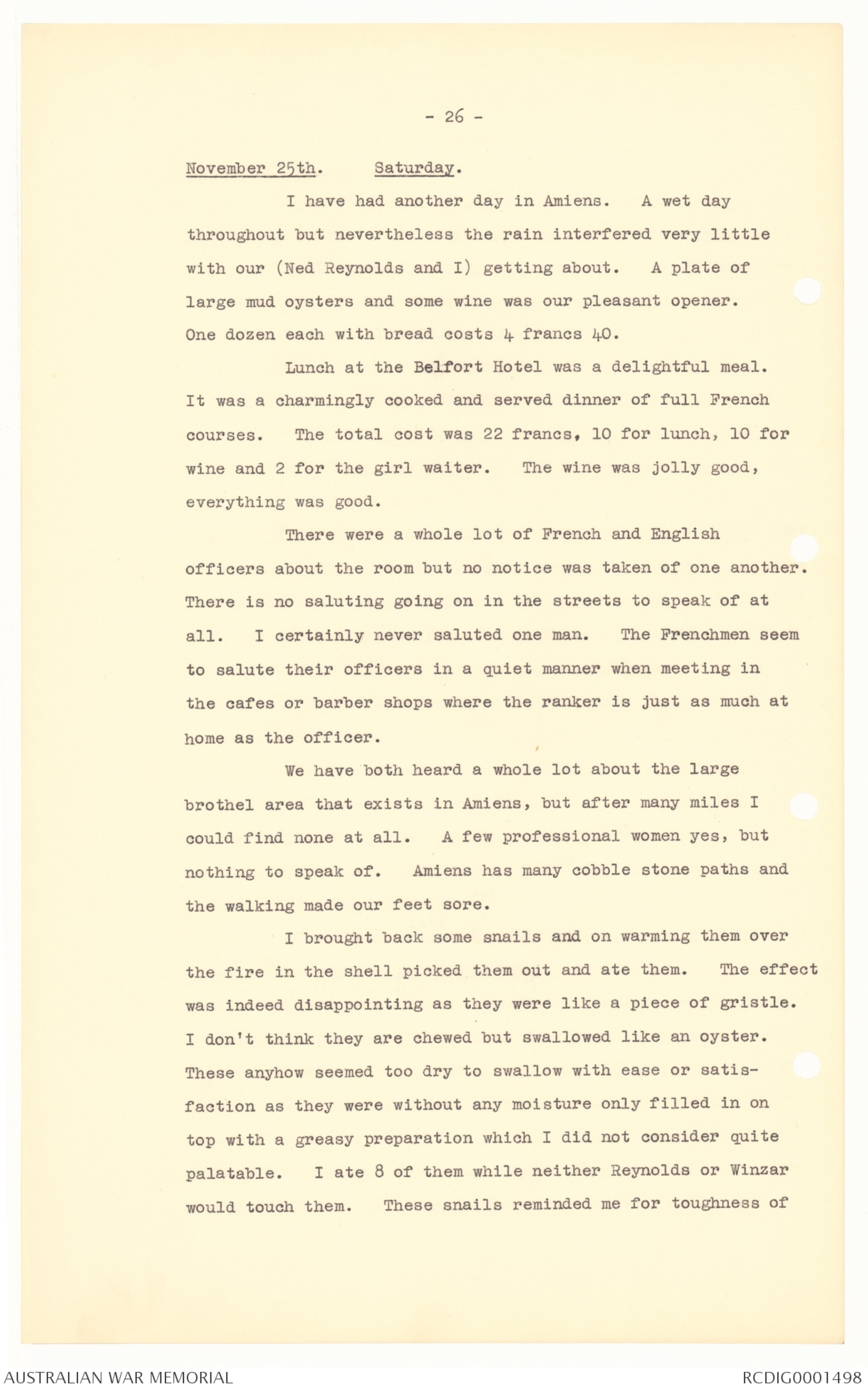
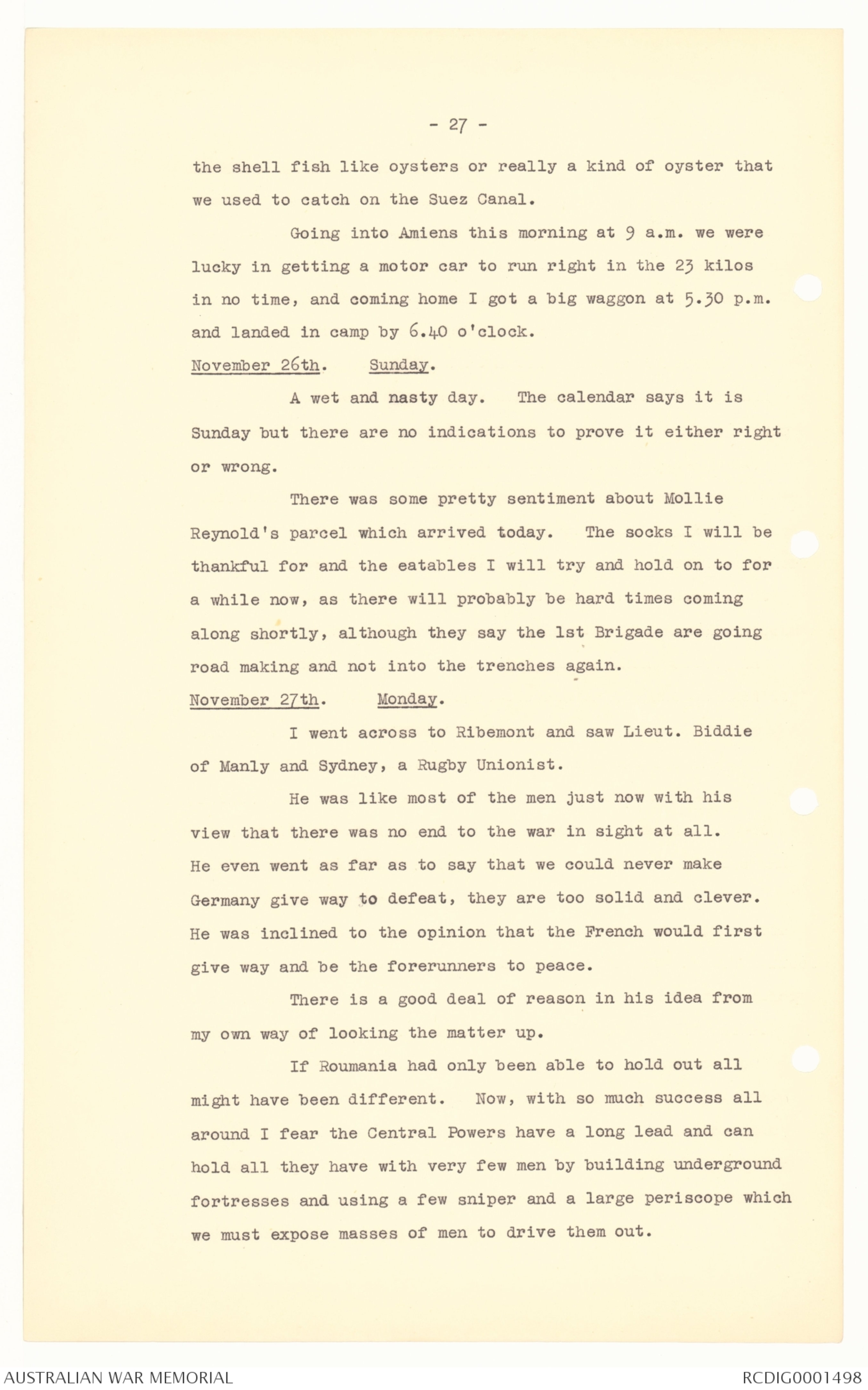
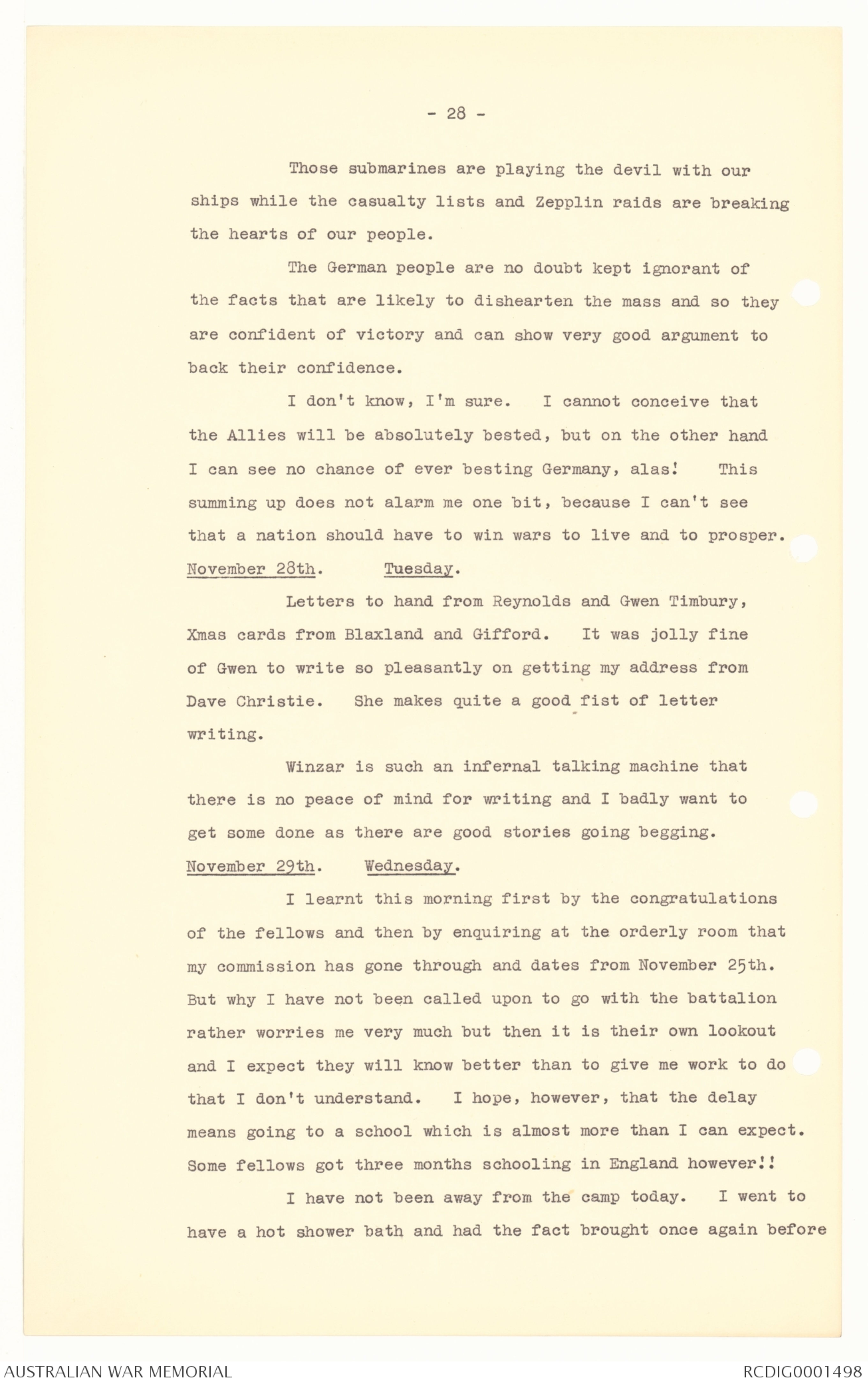
- 19 -
I have posted a parcel to Brother Bert with three
diaries dating from August to October, also some old letters
and two copper shell bands. This clears me right out of
diaries now. Somehow or other I hate to send these roughly
written day to day entries away to be read by others. They
represent my own miseries without any covering of paint and
powder, and even if miseries they can hardly be read correctly
so far away as Australia amongst strange surroundings and
altered conditions. But Bert will be considerate and forgiving
I am sure.
November 21st. Tuesday.
The mist, which was very thick, lifted towards the
afternoon, and having absolutely nothing to do, I set about
making a larger house around the shafts of the farrier's cart
with some blankets and canvas covers, and so, tonight I have
a camp bed to sleep on and a higher roof overhead. Sgt.
Winzar sleeps on a stretcher on the other side.
This afternoon I took a hack out for exercise. At
2 p.m. we struck out across country for the Amiens-Albert Road.
The turf was a little heavy but old Tom was in glorious form
and took his several jumps over some mounds of earth and across
a series of emergency trenches. A Frenchman with a pair of
handsome horses was busy breaking up a long strip of ground
with the commonly used reversable one way, double moulboard
plough, which allowed him to work up and down on the same
furrow. He handled his horses to perfection by word of mouth
and a single rein. It was a charming picture to watch those
heavy, arched and thick necked chestnut horses clinking at
their curb bits and moving steadily and stately along a
perfectly straight line. They moved along as evenly and as
quietly as a pair of Lemnos Island oxen. The driver, an
elderly man, was at ease and unworried by his labours. His
garb was typical of the Picardy farmer, corduroy trousers, many
- 20 -
seasons old and still in good repair; a short waisted jumper
also of corduroy but of a different tint to the pants due to
the latter being sun bleached in the summer months; a red
coloured neckerchief was jammed in around the jumper collar
while a weather worn plush cap without peak or brim fitted
well down all round his head, and his boots had long uppers
and substantial soles. In the grey light of the dull day
the whole effect of this simple ploughing scene was a treasure,
greatly added to by the five black crows that hopped noisily
along the furrows picking up worms and taking but little
interest in anything around about as they gambolled
enthusiastically along.
Away ahead and to my left were whole ranges of
attic roofs fitted on to the ground, in which troops rested
over night en route, or rested for a few days back from the
firing line. On ahead about 300 yards were some 30 large
motor cars standing around and a repair shop nearby. In the
distance and on the hill sides, opened to my view by the
undulating country, were hundreds of bell tents and large
marquees, while in three different directions, standing up
on the sky line like huge mushrooms, were aerodromes or
aeroplane sheds. The main road could be followed for miles
and miles by the double line of tall trees that marked its
course. On moving on to the top of a hill I disturbed a fine
big hare. It got up and jumped away with its short white
tail bobbing and its light brown body bounding with remarkable
pace and ease. I tried to gallop after it. Tom was keen
too and tried his best, but too many years have passed over
the brave old horse's head to enable him to follow it. My
shouts and calls though kept that hare, and also the other one
that got up a few minutes afterwards, running for half a mile
or more.
- 21 -
There were also several small flocks of quail
peacefully moving about. They were much larger than the
Australian quail. Two kinds of crows were in flocks also.
Besides the cunning black crow that we know so well, there
was another one with a black face, wings and tail but a
lightish brown or grey body. He stood as big or perhaps
a little bigger than his black cousin and was equally as
flippant.
I was as yet no more than 1½ miles from camp when
I ran out on to the main road. I would have chosen to stay
out on the fields instead of going on to the hard road, but
there came across my open track a line of barb-wire stretching
for miles with breaks for roads and paths only. These
emergency defences are interwoven and twisted, pegged with
sticks or posts 3 feet above ground. For miles behind our
own line in every direction are these stretches of wire
entanglements, also redoubts and trenches.
Along the road to Albert, 2½ miles, there were
German prisoners at work. They seemed quite jolly and
gazed curiously about at all that is going on, and seemed
to pay me special attention. I thought it rather a laughable
touch to see the Germans putting up a heavy barb-wire compound
or "bird cage" as they are called, for their own confinement
and security.
There seemed to be but little alteration in Albert
since I was last there in August, other than that there were
a number of stores opened in the old shambled buildings. The
streets were crowded with traffic of all kinds, and the traffic
men were at their wits end to keep the lines moving.
Albert is on the Ancre River yet one would never
know, in fact I have been through Albert several times and
could not see the river. Today I first saw it running through
underneath the back portion of the ruined church, (a fine church
- 22 -
at one time, built of red bricks with stone corners and
blocking and with a very tall tower; the Virgin and Child
still hanging right over on to the street). The style of
church is just like many English churches. The square tower
though shaken and battered could still be used as an observation
post. Anyhow the river ran under the church and was used just
outside to drive a water-wheel, and ran on through the town
between narrow brick walls and built over most of the time.
From Albert I turned and came through Dernacourt to
Buire to camp. On the road I passed hundreds of Germans road
making and unloading goods trains. Passing a large depot I
got quite an eye-opener as to the quantities and different
kinds of stores that have to be stocked to keep an army going,
timber of all lengths and sizes in piles covering acres of
ground, corrugated iron in bundles to make natty half round
houses of up behind the line, and a heavy large corrugated
kind to roof over dugouts and to stand the pressure of earth
and sand bags on top; timber from feather weight scantlings
to long lengths of sawn hardwood 18 inches square, and steel
rails and trucks of all sizes. It was a most impressive
collection of piles and piles and stacks upon stacks of one
thing and another, and the only name its got officially is
"Dernacourt Dump".
Up in the area captured from the Germans there are
a whole lot of roads and tracks recently formed. To the
crossings are some of the best known English names applied
such as Picardilly Circus, Oxford Circus, Swansea Circus,
Bloomsbury Road, and Regent Street, etc. etc. A crossing in
Longueval was known as Longueval Circus.
Old Tom seemed to be slowing down and putting up a
joke on me as I had neither whip or spur and he is a cunning
horse, but to his dismay, and thereafter his great concern,
he stepped out in great style.
- 23 -
We passed a newly laid double railway track, and
had a good view of the valley in which the Ancre River runs
over a considerable length. The course of the river was
made plain by the tall and leafless trees that grow in the
somewhat marshy country near its banks. Here and in Belgium
the land is always made use of for growing timber when unsuitable
for cultivation on account of marsh. Along the road for
home there were Germans digging deep holes some 10 feet square
along the road side so as to drain the water off in wet weather.
There are some thousands of these holes on this "Big Push" area,
and they answer very well up to a certain point.
On reaching camp it was nearly dark and yet just
turned 4 o'clock. It was a great afternoon's ride and I was
thankful for being alone as there was only myself to please,
and my mind was not drawn away to other topics and sights than
those I wanted to see and to follow. I might have looked
lonely but I was nevertheless in my element.
At night, or rather after tea, I thought of my fruitless
attempts at writing for the past few days and decided to
stroll up and see the picture show. After some trouble in
locating the building, there being no outward indication of its
whereabouts, I found it made of empty ammunition boxes and lined,
also roofed with a tar-fabric composition. There were 20 long
narrow forms packed closely together, and some of them were
evidently made for another purpose as bomb cases were used to
make them long enough for their present need. 16 men sat at
each form, and as I was late and having paid 2d entrance fee,
stood against the wall and enjoyed the three films I saw. The
crowd was in good humour and enjoyed the show also, even if
they did laugh aloud when the hero was again and again rescued
from impossible positions.
I was compelled to put my light out at 10 p.m. or
I would have read.
- 24 -
November 22nd. Wednesday.
It was a heavy misty morning but at midday a
smothered sun appeared. At 2 o'clock I mounted "John
Gilpin", Ned Reynolds on "Old Tom" and off we went to
Heilly, a decent village 6 kilos away. There the sun
shone strongly and I enjoyed the exhilaration of riding
over the springy turf fields, moreso as "John" is a good
trotter and can jump cleanly over gutters and holes.
At night I waited with three other chaps in a
double line for the second house at the picture show but
the place was full before our turn to enter came so we had
a pint of cold beer and some biscuits, and with cold feet
wandered back to the canvas home between the shafts of
"Windy's" cart. It was necessary to light the fire, so
to get wood a post was removed from the road side and it
warmed us up some.
At present I have a lovely camp stretcher to sleep
on and about six blankets, yet I cover up my head each night
and find my feet cold very often. What I will do when in the
line with one or no blankets at all, is causing me a little
worry even now.
November 23rd. Thursday.
We are preparing to move off again. At a grand
parade of the transport section today all was in good order
and ready to leave.
I am intent on writing tonight if only to fix up
a reply to Angus Ferguson and a line to Bert.
Bill's letter today was very pleasing. The three
houses acquired for £l,050 seems a bargain right enough and
if the world settles down to its normal footing shortly these
should be worth money or at any rate a jolly good living for
the old folk. Even if the war continues South African mining
fields are hardly likely to suffer as gold must be won to carry
- 25 -
on our end of the war; that being so, Johannesburg should
not go back. At the same time I wish that we owned the
same property in Sydney. There it would be more valuable
and for the old folk more congenial.
Today has been the best and brightest day we've
had for a long time. I washed three woollen shirts, but
owing to the darkness falling at A o'clock they had not time
to dry.
Our bearer division has gone road making to fill
up their spell from the trenches. This is better than
lounging around and will do them more good than parades,
route marches and drilling, much as they may squeak about
it. Anyhow, they will squeak and grumble at anything, so
it doesn't much matter.
November 24th. Friday
There has been nothing much doing today. In the
afternoon I spent two hours dressing up some "greasy" heeled
horses and then went off 3 kilos away to Ribemont to find out
how Sid Middleton was, but failed as his battalion, 19th, have
not yet come back from the firing line. I walked hard all
the way back through Merricourt to camp and was pleased with
the exercise having walked probably 12 kilometres at a strong
pace.
The night is not nearly so cold. I slept without
even putting my head under the blankets, a habit I've got into
since Gallipoli. Over in Gallipoli it was necessary to prevent
the dirt from fretting away and falling on your face, as well as
to keep out the sound of our own gun fire, or in the daylight
sleeping after night work to keep out the strong light. In
France the only occasion to do it is when sleeping near the
firing line, but it also keeps one a little warmer when blankets
are scarce, and then it drifts into a habit.
- 26 -
November 25th. Saturday.
I have had another day in Amiens. A wet day
throughout but nevertheless the rain interfered very little
with our (Ned Reynolds and I) getting about. A plate of
large mud oysters and some wine was our pleasant opener.
One dozen each with bread costs A francs 40.
Lunch at the Belfort Hotel was a delightful meal.
It was a charmingly cooked and served dinner of full French
courses. The total cost was 22 francs, 10 for lunch, 10 for
wine and 2 for the girl waiter. The wine was jolly good,
everything was good.
There were a whole lot of French and English
officers about the room but no notice was taken of one another.
There is no saluting going on in the streets to speak of at
all. I certainly never saluted one man. The Frenchmen seem
to salute their officers in a quiet manner when meeting in
the cafes or barber shops where the ranker is just as much at
home as the officer.
We have both heard a whole lot about the large
brothel area that exists in Amiens, but after many miles I
could find none at all. A few professional women yes, but
nothing to speak of. Amiens has many cobble stone paths and
the walking made our feet sore.
I brought back some snails and on warming them over
the fire in the shell picked them out and ate them. The effect
was indeed disappointing as they were like a piece of gristle.
I don't think they are chewed but swallowed like an oyster.
These anyhow seemed too dry to swallow with ease or satisfaction
as they were without any moisture only filled in on
top with a greasy preparation which I did not consider quite
palatable. I ate 8 of them while neither Reynolds or Winzar
would touch them. These snails reminded me for toughness of
- 27 -
the shell fish like oysters or really a kind of oyster that
we used to catch on the Suez Canal.
Going into Amiens this morning at 9 a.m. we were
lucky in getting a motor car to run right in the 23 kilos
in no time, and coming home I got a big waggon at 5.30 p.m.
and landed in camp by 6.40 o'clock.
November 26th. Sunday.
A wet and nasty day. The calendar says it is
Sunday but there are no indications to prove it either right
or wrong.
There was some pretty sentiment about Mollie
Reynold's parcel which arrived today. The socks I will be
thankful for and the eatables I will try and hold on to for
a while now, as there will probably be hard times coming
along shortly, although they say the 1st Brigade are going
road making and not into the trenches again.
November 27th. Monday.
I went across to Ribemont and saw Lieut. Biddie
of Manly and Sydney, a Rugby Unionist.
He was like most of the men just now with his
view that there was no end to the war in sight at all.
He even went as far as to say that we could never make
Germany give way to defeat, they are too solid and clever.
He was inclined to the opinion that the French would first
give way and be the forerunners to peace.
There is a good deal of reason in his idea from
my own way of looking the matter up.
If Roumania had only been able to hold out all
might have been different. Now, with so much success all
around I fear the Central Powers have a long lead and can
hold all they have with very few men by building underground
fortresses and using a few sniper and a large periscope which
we must expose masses of men to drive them out.
- 28 -
Those submarines are playing the devil with our
ships while the casualty lists and Zepplin raids are breaking
the hearts of our people.
The German people are no doubt kept ignorant of
the facts that are likely to dishearten the mass and so they
are confident of victory and can show very good argument to
back their confidence.
I don't know, I'm sure. I cannot conceive that
the Allies will be absolutely bested, but on the other hand
I can see no chance of ever besting Germany, alas! This
summing up does not alarm me one bit, because I can't see
that a nation should have to win wars to live and to prosper.
November 28th. Tuesday.
Letters to hand from Reynolds and Gwen Timbury,
Xmas cards from Blaxland and Gifford. It was jolly fine
of Gwen to write so pleasantly on getting my address from
Dave Christie. She makes quite a good fist of letter
writing.
Winzar is such an infernal talking machine that
there is no peace of mind for writing and I badly want to
get some done as there are good stories going begging.
November 29th. Wednesday.
I learnt this morning first by the congratulations
of the fellows and then by enquiring at the orderly room that
my commission has gone through and dates from November 25th.
But why I have not been called upon to go with the battalion
rather worries me very much but then it is their own lookout
and I expect they will know better than to give me work to do
that I don't understand. I hope, however, that the delay
means going to a school which is almost more than I can expect.
Some fellows got three months schooling in England however!!
I have not been away from the camp today. I went to
have a hot shower bath and had the fact brought once again before
 Sam scott
Sam scottThis transcription item is now locked to you for editing. To release the lock either Save your changes or Cancel.
This lock will be automatically released after 60 minutes of inactivity.